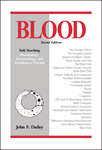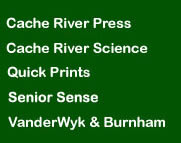|
| |

| Blood,
Second Edition | |  |
by: John F. Dailey
BLOOD offers greater coverage of blood physiology, immunology,
transfusions, transfusion complications, autologous blood
recovery, and other subjects found in Dailey's Notes on Blood.
Additional topics, such as special circulations, MHC, apheresis,
oxygen transport, and bone marrow transplant, are covered.
Also included are 78 commonly ordered blood tests, with uses,
results, and value indications. 576 pages, 68 illustrations
First Place Winner
American Medical Writers Association
Book Awards Competition, Allied Health Category, 1999
|
3.
|
Special Circulations:
Cardiac, Renal, Hepatic, and Fetal
Introduction, The Heart and Coronary Circulation:
Right and Left Coronary Arteries, Coronary Venous
System, Microvasculature of the Heart, Heart Disease;
The Kidneys and Renal Blood Flow: Renal Function,
Structure of the Kidneys, Route of Renal Blood Flow;
The Liver and Hepatic Circulation: Liver Functions,
Anatomy and Circulation of the Liver, Plasma Protein
Production, Bile Production, Disorders of the Liver;
Fetal Circulation: Route of Fetal Blood Flow, Fetal
Circulation at Birth, Congenital Defects
|
|
|
4.
|
Red Blood Cells
Introduction, Erythropoiesis, Shape, Life Span, Number,
Anemia, Hemoglobin, Fetal Hemoglobin, Abnormal Hemoglobin
Molecules, 2,3-Diphosphoglycerate, The Hematocrit,
Red Cell Hemolysis
|
|
|
5.
|
Oxygen and Carbon Dioxide Transport
Introduction, Role of Hemoglobin in Respiration, The
Oxyhemoglobin Dissociation Curve, The Affinity of
Oxygen for Hemoglobin, External and Internal Respiration,
Carbon Dioxide Transport to the Lungs, Bicarbonate
Ion Production in Carbon Dioxide Transport
|
|
|
6.
|
White Blood Cells
Introduction, Locations and Life Spans, Number, Types
of White Cells, Properties of White Cells, Myeloid
and Lymphoid Cell Lines, White Cells of the Myeloid
Lineage, Cells of the Lymphoid Lineage
|
|
|
7.
|
Antigen, Antibody, and Complement
Introduction, Antigen and Immunogen, Antibody Molecules,
Classes of Antibodies, The Complement System, Complement
Proteins, Complement Pathways, Membrane Attack Complex,
Defects and Deficiencies of the Complement System,
Complement Activation in the Absence of Antigen
|
|
|
8.
|
The Major Histocompatibility Complex
Molecules
Introduction, Alloimmunization, Classes of MHC Molecules,
Human Leukocyte Antigens, Genetics of the MHC Molecules,
Identification of HLA
|
|
|
9.
|
The Immune System
Introduction, Innate and Acquired Immunity, The Immune
Response, Targets of the Immune Response, Role of
the Lymphatic System in Immunity, Human Intervention:
Vaccination and Antiserum, Disorders of Immunity
|
|
|
10.
|
Plasma
Introduction, Blood Volume, Plasma Proteins, Protein
Abnormalities, Nonprotein Plasma Solutes, Mechanisms
of Fluid Movement
|
|
|
11.
|
Platelets
Introduction, Shape, Life Span and Location, Numbers,
Hemostasis,
Prostaglandins that Regulate ADP Release in Platelet
Aggregation, Platelet Aggregation on Foreign Surfaces,
Platelet Disorders, Platelet Quality, Diagnostic Tests
for Platelet Disorders, Treatment for Platelet Disorders
|
|
|
12.
|
Coagulation
Introduction, Coagulation Components, Pathways of
Coagulation, Clot Retraction, Clot Lysis and Vascular
Repair, Natural Anticoagulants, Vitamin K and Coumadin®,
Fibrin Split Products, Hemostatic Disorders, Disseminated
Intravascular Coagulation
|
|
|
13.
|
ABO and Rh Blood Group
Systems
Introduction, ABO Blood Group Systems, ABO Compatibility,
ABO Incompatibility in Transfusion, ABO Compatibility
in Organ Transplantation, Rh Blood Group System, Rh
Hemolytic Disease of the Newborn, Therapies for HDN,
Rh Immune Globulin, ABO Hemolytic Disease of the Newborn
|
|
|
14.
|
Blood Transfusion
Introduction, Blood Collection, Testing of Donated
Blood, Citrate Anticoagulants-preservatives for Whole
Blood Collection, Blood Storage, Blood Grouping and
Cross Matching for Transfusions, Blood Filtering,
The Blood Transfusion
|
|
|
15.
|
Adverse Events in Transfusion
Introduction, Adverse Events Involving an Immune Response,
Hemolytic Transfusion Reactions, Allergic Reactions,
Anaphylactic Transfusion Reactions, Anaphylactoid
Reactions, Vasovagal Response, Other Causes of Anaphylactic
and Anaphylactoid Reactions, Febrile Nonhemolytic
Transfusion Reactions, Transfusion-related Acute Lung
Injury, Transfusion-associated Graft-versus-host Disease,
Post-transfusion Purpura, Nonimmune Adverse Events
|
|
|
16.
|
Transfusion and Disease
Transmission
Introduction, Blood Testing, Other Tranfusion-transmissible
Diseases, Hepatitis, Hepatitis B, Hepatitis C, HIV
and AIDS, Human T Cell Lymphotropic Viruses, Syphilis,
Cytomegalovirus, Bacterial Contamination of Blood
|
|
|
17.
|
Component Therapy
Introduction, Whole Blood, Leukocyte-reduced Blood
Components, Packed Red Cells, Platelets, Pooled Platelets,
Plasma Components, Granulocytes, Volume Expanders,
Crystalloid Solutions, Colloids, Hematopoietic Growth
Factors.
|
|
|
18.
|
Apheresis
Introduction, Complications, Apheresis Techniques,
Plateletpheresis, Leukapheresis, Peripheral Blood
Progenitor Cell Apheresis, Allogeneic PBPC Collection
and Infusion, Therapeutic Apheresis
|
|
|
19.
|
Methods of Autologous Blood Recovery
Introduction, Complement Activation with Blood Collection
Systems, Storage of Autologous Blood, Predonation,
Intraoperative Hemodilution, Intraoperative Blood
Salvage, Wash and Nonwash Collection Systems, Postoperative
Blood Collection
|
|
|
20.
|
Bone Marrow Transplantation
Introduction, Stem and Progenitor Cells, Candidates
for Bone Marrow Transplantation, HLA Compatibility
in Bone Marrow Transplantation, The Transplantation
Procedure, Complications, Graft-versus-host Disease
|
|
Answers to Questions
Glossary
Blood Tests
Appendix I - Heparin
Appendix II - Scientific Symbols and Their Equivalents
Bibliography
Index
Illustrations (68)
Charts (4)

Review
"Blood admirably meets its goal of providing
accurate, easy-to-understand, detailed information about every
aspect of the production, structure, circulation, function,
testing, and use of blood and its many components. The book
is clearly organized and contains numerous features to enhance
learning. The text is highly readable and a ready reference
for students and professionals in life sciences and health
care. ... put this text at the top of the acquisition list
for any library serving students in allied health sciences
and make it essential reading for perfusionists, nurses, and
others who care for patients with hematologic disorders."
American Medical Writers Association Journal, Vol. 15, No.
2, Spring 2000
Other Reviews

Our Commitment
to You
At Quick Publishing we are committed to providing quality educational,
inspirational, and entertaining materials that will help the reader
to achieve educational or personal goals. To learn more about our
company, click
here.
| |







